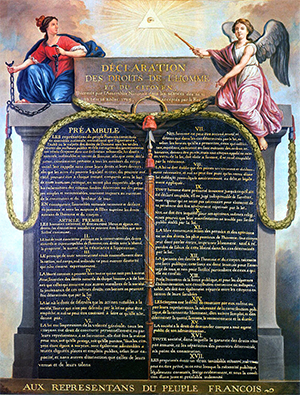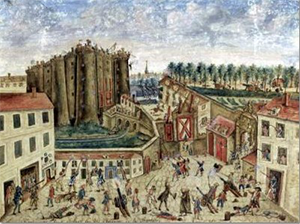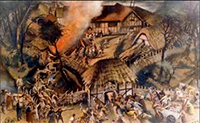The French King Louis XVI
Part 4: Declaration and Revolution
One of the several important causes of the French Revolution was a stark economic situation. A succession of poor harvests had resulted in a rise in the price of bread, particularly, and other goods, and the poor, especially, struggled even more than they had in the past to afford basic things. The peasants who pillaged their lords' and/or landowners' estates certainly found short-term supplies of food and other staples, but that would not have been the case for everyone who had such needs. All of the political wrangling over rights and representation did little to deal with the still mountainous national debt and the still free-spending royals and other nobles. In response, the Assembly named the former royal finance director Jacques Necker as its chief financial officer and gave him a large amount of power to fix the situation. 
One of the prime achievements of the National Constituent Assembly was the creation of the Declaration of the Rights of Man and of the Citizen, in August 1789. Helping draft this landmark document was the Marquis de Lafayette, who had returned after helping the United States win its independence from Great Britain. Clearly inspiring the language and intent were the words and ideas found in the American Declaration of Independence. The overarching pronouncement of this product of learned counsel was that "men are born and remain free and equal in rights." This was a direct contravention to the idea that a monarch had absolute authority over his or her subjects. Meanwhile, the women of France were having a worse time of it than the men. For all of the equality crammed into the Declaration, it didn't mention women; in fact, it specifically said men are "born free and equal." On Oct. 5, 1789, a crowd of 7,000 women gathered at markets in Paris and marched 
On July 14, 1790, the country marked a year since the Storming of the Bastille by celebrating the drive toward greater equality. Charles-Maurice de Talleyrand, a former clergyman who had attended the Estates-General and then sided with the Third Estate and helped write the Declaration of the Rights of Man and of the Citizen, led a mass on that day, during which those in attendance swore allegiance not to any deity or religious authority figure but to "the nation, the law, and the king." That gathering was one of several that took place during a handful of days. The king and royal family attended several of those gatherings. The Assembly on Oct. 31, 1790 removed all restrictions on internal trade, making free trade possible across the country. This removed another source of revenue, customs duties, on which the Crown had depended for many a year. |
|
Social Studies for Kids
copyright 2002–2026
David White



 While all of this legislative uncertainty was taking place in Paris and surrounds, out in the countryside the situation was anything but civil. In a period known as the Great Fear, peasants revolted against their masters and landowners, pillaging and plundering and venting many generations of frustration on their social and economic betters. On August 4, the National Constituent Assembly did away with serfdom.
While all of this legislative uncertainty was taking place in Paris and surrounds, out in the countryside the situation was anything but civil. In a period known as the Great Fear, peasants revolted against their masters and landowners, pillaging and plundering and venting many generations of frustration on their social and economic betters. On August 4, the National Constituent Assembly did away with serfdom. to Versailles, demanding that the king and the Assembly listen to their concerns about their plight in life. They also implored both monarch and legislative body to move to Paris, where a large population resided, rather than ensconce themselves at Versailles, far away from the still unsettling events in the capital. The women brought with them a considerable number of weapons, not only handheld ones but also a handful of cannons. Lafayette and 20,000 of the National Guard kept the peace, barely, but couldn't stop many of the crowd from storming the palace and killing a handful of guards. The next day, the king and his family agreed to move to Paris.
to Versailles, demanding that the king and the Assembly listen to their concerns about their plight in life. They also implored both monarch and legislative body to move to Paris, where a large population resided, rather than ensconce themselves at Versailles, far away from the still unsettling events in the capital. The women brought with them a considerable number of weapons, not only handheld ones but also a handful of cannons. Lafayette and 20,000 of the National Guard kept the peace, barely, but couldn't stop many of the crowd from storming the palace and killing a handful of guards. The next day, the king and his family agreed to move to Paris.
